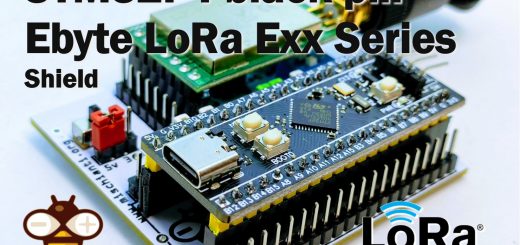Home › Forums › The libraries hosted on the site › EByte LoRa e32 UART devices sx1262/sx1268 › Problem getting structure
- This topic has 10 replies, 2 voices, and was last updated 1 year, 4 months ago by
 poe.
poe.
-
AuthorPosts
-
-
31 July 2024 at 09:24 #31164
Hello!
I have a transmitter that needs to transmit a structurevoid Task_LoRaSender(void) { struct LoraData { char type[3] = "ND"; uint8_t dev_id = config.DevID; int32_t latitude = gnss_latitude; int32_t longitude = gnss_longitude; int32_t altitude = gnss_altitude; uint8_t crc8; } lora_data; lora_data.crc8 = get_crc_8((const char *)&lora_data, sizeof(lora_data) - sizeof(lora_data.crc8)); ResponseStatus response_status = LORA_E32.sendFixedMessage(BASE_ADDR_H, BASE_ADDR_L, BASE_RF_CHANNEL, &lora_data, sizeof(lora_data)); char buffer_navigation_data[256]; snprintf(buffer_navigation_data, sizeof(buffer_navigation_data), "Type: %s, ID: %d | LTD: %ld, LNG: %ld, ALT: %ld | CRC: 0x%02X", lora_data.type, lora_data.dev_id, lora_data.latitude, lora_data.longitude, lora_data.altitude, lora_data.crc8); SEND_DEBUG_MSG(buffer_navigation_data); }In the serial port I see (Its Ok):
Type: ND, ID: 3 | LTD: 59916757, LNG: 33590709, ALT: 127690 | CRC: 0xE0
I am successfully sending data over the air.
=================================
On the receiving side my code is:struct LoRaNavData { char type[3]; uint8_t dev_id; int32_t latitude; int32_t longitude; int32_t altitude; uint8_t crc8; }; void Task_LoRa(void) { if (LORA_E32.available() > 1) { char type[3]; ResponseContainer rs = LORA_E32.receiveInitialMessage(sizeof(type)); String type_str = rs.data; if (type_str == "ND") { SEND_DEBUG_MSG("Navigation Data"); ResponseStructContainer rsc = LORA_E32.receiveMessage(sizeof(LoRaNavData)); struct LoRaNavData nav_data = *(LoRaNavData *)rsc.data; char buffer_navigation_data[256]; snprintf(buffer_navigation_data, sizeof(buffer_navigation_data), "Type: %s, ID: %d | LTD: %ld, LNG: %ld, ALT: %ld | CRC: 0x%02X", type_str, nav_data.dev_id, nav_data.latitude, nav_data.longitude, nav_data.altitude, nav_data.crc8); SEND_DEBUG_MSG(buffer_navigation_data); rsc.close(); } else { Serial.println("Something Goes Wrong!"); } } }In the serial port I see something like this (not what I expected):
Type: ND, ID: 54 | LTD: -1526807549, LNG: 57776641, ALT: 0 | CRC: 0x00I did everything according to the example, the structures are the same, but I get something completely different from what I send.
How to correctly receive structures?
-
31 July 2024 at 09:34 #31165
Hi Poe,
try to passchar type[3] = "NDX";and give us feedback.
Bye Renzo -
31 July 2024 at 09:39 #31166
On the sender’s side?
Compilation error: initializer-string for ‘char [3]’ is too long [-fpermissive] -
31 July 2024 at 09:47 #31167
Hi,
ahh! Yes, the Terminator character.
It’s strange. Try to add this.#pragma pack(push, 1) struct LoRaNavData { char type[3]; uint8_t dev_id; int32_t latitude; int32_t longitude; int32_t altitude; uint8_t crc8; }; #pragma pack(pop)Bye RM
-
31 July 2024 at 10:07 #31168
Not working
My senderstruct LoraData { char type[3] = "ND"; // Тип структуры (навигационные данные) uint8_t dev_id = config.DevID; // ID Устройства int32_t latitude = gnss_latitude; // Широта (миллионные доли градуса) int32_t longitude = gnss_longitude; // Долгота (миллионные доли градуса) int32_t altitude = gnss_altitude; // Высота (миллиметр) int32_t speed = gnss_speed; // Скорость int32_t course = gnss_course; // Курс (тысячные доли градуса по часовой стрелке от севера) uint8_t num_satellites = gnss_num_satellites; // Количество видимых спутников (штук) uint8_t hdop = gnss_hdop; // Точность позиционирования (десятые доли, 11 соответствует 1.1) uint16_t sdeg = servo_deg; // Текущий угол серво машинки uint8_t crc8; // Контрольная сумма структуры } lora_data; lora_data.crc8 = get_crc_8((const char *)&lora_data, sizeof(lora_data) - sizeof(lora_data.crc8)); char buffer_navigation_data[256]; snprintf(buffer_navigation_data, sizeof(buffer_navigation_data), "Type: %s, ID: %d | LTD: %ld, LNG: %ld, ALT: %ld | SPD: %ld, CRS: %ld | SATs: %d, HDOP: %d, SDeg: %d | CRC: 0x%02X", lora_data.type, lora_data.dev_id, lora_data.latitude, lora_data.longitude, lora_data.altitude, lora_data.speed, lora_data.course, lora_data.num_satellites, lora_data.hdop, lora_data.sdeg, lora_data.crc8); SEND_DEBUG_MSG(buffer_navigation_data); /* Отправляем пакет */ ResponseStatus response_status = LORA_E32.sendFixedMessage(BASE_ADDR_H, BASE_ADDR_L, BASE_RF_CHANNEL, &lora_data, sizeof(LoraData));Serial Out:
Debug Sensor: Type: ND, ID: 1 | LTD: 53916881, LNG: 27590083, ALT: 220450 | SPD: 0, CRS: 199210 | SATs: 8, HDOP: 16, SDeg: 0 | CRC: 0xE9My receiver
/* Структура навигационных данных */ #pragma pack(push, 1) struct NavData { char type[3]; // Тип структуры (навигационные данные) uint8_t dev_id; // ID Устройства int32_t latitude; // Широта (миллионные доли градуса) int32_t longitude; // Долгота (миллионные доли градуса) int32_t altitude; // Высота (миллиметр) int32_t speed; // Скорость int32_t course; // Курс (тысячные доли градуса по часовой стрелке от севера) uint8_t num_satellites; // Количество видимых спутников (штук) uint8_t hdop; // Точность позиционирования (десятые доли, 11 соответствует 1.1) uint16_t sdeg; // Текущий угол серво машинки uint8_t crc8; // Контрольная сумма структуры }; #pragma pack(pop) void Task_LoRa(void) { if (LORA_E32.available() > 1) { char type[3]; ResponseContainer rs = LORA_E32.receiveInitialMessage(sizeof(type)); /* Извлекаем тип пакета */ String type_str = rs.data; if (type_str == "ND") { ResponseStructContainer rsc = LORA_E32.receiveMessage(sizeof(NavData)); struct NavData lora_data = *(NavData *)rsc.data; char buffer_navigation_data[256]; snprintf(buffer_navigation_data, sizeof(buffer_navigation_data), "Type: %s, ID: %d | LTD: %ld, LNG: %ld, ALT: %ld | SPD: %ld, CRS: %ld | SATs: %d, HDOP: %d, SDeg: %d | CRC: 0x%02X", type_str, lora_data.dev_id, lora_data.latitude, lora_data.longitude, lora_data.altitude, lora_data.speed, lora_data.course, lora_data.num_satellites, lora_data.hdop, lora_data.sdeg, lora_data.crc8); SEND_DEBUG_MSG(buffer_navigation_data); rsc.close(); } else { Serial.println("Something Goes Wrong!"); } } }Serial Out:
Debug Base: Type: ND, ID: 54 | LTD: -1526879741, LNG: 56181761, ALT: 0 | SPD: 88983040, CRS: 1116160 | SATs: 0, HDOP: 240, SDeg: 1550 | CRC: 0x00I receive something completely different from what I sent.
-
31 July 2024 at 10:14 #31169
But do you use the same MCU for the sender and receiver?
-
31 July 2024 at 10:17 #31170
Aaah, no, wait, you read the first 3 bytes, then you try to reread the first 3 bytes again.
You must create a structure for the remaining data.Check this article that explains how to manage the initial message.
Bye RM
-
31 July 2024 at 10:20 #31171
I have two ESP32 modules and two LoRa E32-443T33D.
One set sends data (structure).
The second set receive data.I output a formatted string with the values in the structure to the console.
Both structures are the same (transmitter and receiver).
The types of variables in the structure are also the same.
For example, I send dev_id = 1, and receive 54.Sender
Debug Sensor: Type: ND, ID: 1 | LTD: 53916832, LNG: 27590070, ALT: 220810 | SPD: 0, CRS: 199210 | SATs: 8, HDOP: 16, SDeg: 0 | CRC: 0x89
Reciver
Debug Base: Type: ND, ID: 54 | LTD: -1526821373, LNG: 53004801, ALT: 0 | SPD: 50997760, CRS: 919552 | SATs: 0, HDOP: 197, SDeg: 0 | CRC: 0x00 -
31 July 2024 at 10:24 #31173
The structure can’t be the same if you read the first 3 bytes.
Check the last sketch in the link I posted before.
Bye RM
-
31 July 2024 at 10:36 #31174
Yes, it worked!
Thank you! -
31 July 2024 at 13:12 #31176
Another question arose about calculating the checksum of the structure…
In the transmitter, I form a static structure (for testing) and send it.#pragma pack(push, 1) struct LoraData { char type[3] = "ND"; // Тип структуры (навигационные данные) uint8_t dev_id = 1; // ID Устройства int32_t latitude = 2; // Широта (миллионные доли градуса) int32_t longitude = 3; // Долгота (миллионные доли градуса) int32_t altitude = 4; // Высота (миллиметр) int32_t speed = 5; // Скорость int32_t course = 6; // Курс (тысячные доли градуса по часовой стрелке от севера) uint8_t num_satellites = 7; // Количество видимых спутников (штук) uint8_t hdop = 8; // Точность позиционирования (десятые доли, 11 соответствует 1.1) uint16_t sdeg = 9; // Текущий угол серво машинки uint8_t crc8; // Контрольная сумма структуры } lora_data; #pragma pack(pop) lora_data.crc8 = get_crc_8((const char *)&lora_data, sizeof(lora_data) - sizeof(lora_data.type) - sizeof(lora_data.crc8)); ResponseStatus response_status = LORA_E32.sendFixedMessage(BASE_ADDR_H, BASE_ADDR_L, BASE_RF_CHANNEL, &lora_data, sizeof(LoraData));The checksum is 0x88 (without the type and crc8 fields)
Receiver code
void Task_LoRa(void) { if (LORA_E32.available() > 1) { /* Извлекаем тип пакета */ char type[3]; ResponseContainer rs = LORA_E32.receiveInitialMessage(sizeof(type)); String type_str = rs.data; if (type_str == "ND") { /* Пакет с навигационными данными */ /* Создаем структуру с точным количеством выделенной памяти */ #pragma pack(push, 1) struct NavData { uint8_t dev_id; // ID Устройства int32_t latitude; // Широта (миллионные доли градуса) int32_t longitude; // Долгота (миллионные доли градуса) int32_t altitude; // Высота (миллиметр) int32_t speed; // Скорость int32_t course; // Курс (тысячные доли градуса по часовой стрелке от севера) uint8_t num_satellites; // Количество видимых спутников (штук) uint8_t hdop; // Точность позиционирования (десятые доли, 11 соответствует 1.1) uint16_t sdeg; // Текущий угол серво машинки uint8_t crc8; // Контрольная сумма структуры } nav_data; #pragma pack(pop) ResponseStructContainer rsc = LORA_E32.receiveMessage(sizeof(NavData)); nav_data = *(NavData *)rsc.data; /* Проверяем контрольную сумму */ uint8_t crc8_calc = get_crc_8((const char *)&nav_data, sizeof(nav_data) - sizeof(nav_data.crc8)); char buffer_crc[256]; snprintf(buffer_crc, sizeof(buffer_crc), "ID: %d | Rem CRC8: 0x%02X | Cal CRC8: 0x%02X", nav_data.dev_id, nav_data.crc8, crc8_calc); SEND_DEBUG_MSG(buffer_crc); if (crc8_calc != nav_data.crc8) { SEND_DEBUG_MSG("ER! CRC8 Navigation Data"); rsc.close(); return; } rsc.close(); } else { Serial.println("Something Goes Wrong!"); } } }But the checksum is 0x04 (without crc8 fields)
I use receiveInitialMessage.
What could be the problem with the checksum calculation?
The calculation function is the same on both sides.
-
-
AuthorPosts
- You must be logged in to reply to this topic.





